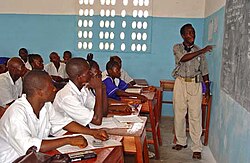| online and campus degrees |
|
| Degrees By Type |
|
| Degrees By Level |
|
| Degrees By Subject |
Degrees By Subject
|
|
|||||||||||||||||||||||||||||||||||||||||||||||||||||||||||||||||||||||||

A teacher in a classroom at a secondary school in Pendembu, Sierra Leone. |
|
| Occupation | |
|---|---|
| Names | Teacher, schoolteacher |
Occupation type |
Profession |
Activity sectors |
Education |
| Description | |
| Competencies | Pedagogy, subject knowledge; competence in teaching the subject, in curriculum, in learner assessment; psychology; planning; leadership. |
Education required |
(varies by country) Teaching certification |
Fields of employment |
Schools |
Related jobs |
Professor, academic, lecturer, tutor |
Informally the role of teacher may be taken on by anyone (e.g. when showing a colleague how to perform a specific task). In some countries, teaching young people of school age may be carried out in an informal setting, such as within the family (homeschooling), rather than in a formal setting such as a school or college. Some other professions may involve a significant amount of teaching (e.g. youth worker, pastor).
In most countries, formal teaching of students is usually carried out by paid professional teachers. This article focuses on those who are employed, as their main role, to teach others in a formal education context, such as at a school or other place of initial formal education or training.
Education is the process of facilitating learning, or the acquisition of knowledge, skills, values, beliefs, and habits. Educational methods include storytelling, discussion, teaching, training, and directed research. Education frequently takes place under the guidance of educators and also learners may also educate themselves. Education can take place in formal or informal settings and any experience that has a formative effect on the way one thinks, feels, or acts may be considered educational. The methodology of teaching is called pedagogy.
Formal education is commonly divided formally into such stages as preschool or kindergarten, primary school, secondary school and then college, university, or apprenticeship.
In most contemporary educational systems of the world, secondary education comprises the formal education that occurs during adolescence. It is characterized by transition from the typically compulsory, comprehensive primary education for minors, to the optional, selective tertiary, "postsecondary", or "higher" education (e.g. university, vocational school) for adults. Depending on the system, schools for this period, or a part of it, may be called secondary or high schools, gymnasiums, lyceums, middle schools, colleges, or vocational schools. The exact meaning of any of these terms varies from one system to another. The exact boundary between primary and secondary education also varies from country to country and even within them but is generally around the seventh to the tenth year of schooling.
Secondary education occurs mainly during the teenage years. In the United States, Canada, and Australia, primary and secondary education together are sometimes referred to as K-12 education, and in New Zealand Year 1–13 is used. The purpose of secondary education can be to give common knowledge, to prepare for higher education, or to train directly in a profession.
Secondary education in the United States did not emerge until 1910, with the rise of large corporations and advancing technology in factories, which required skilled workers. In order to meet this new job demand, high schools were created, with a curriculum focused on practical job skills that would better prepare students for white collar or skilled blue collar work. This proved beneficial for both employers and employees, since the improved human capital lowered costs for the employer, while skilled employees received higher wages.
Secondary education has a longer history in Europe, where grammar schools or academies date from as early as the 16th century, in the form of public schools, fee-paying schools, or charitable educational foundations, which themselves date even further back.
Community colleges offer another option at this transitional stage of education. They provide nonresidential junior college courses to people living in a particular area.
Higher education, also called tertiary, third stage, or postsecondary education, is the non-compulsory educational level that follows the completion of a school such as a high school or secondary school. Tertiary education is normally taken to include undergraduate and postgraduate education, as well as vocational education and training. Colleges and universities mainly provide tertiary education. Collectively, these are sometimes known as tertiary institutions. Individuals who complete tertiary education generally receive certificates, diplomas, or academic degrees.
Higher education typically involves work towards a degree-level or foundation degree qualification. In most developed countries, a high proportion of the population (up to 50%) now enter higher education at some time in their lives. Higher education is therefore very important to national economies, both as a significant industry in its own right and as a source of trained and educated personnel for the rest of the economy.
University education includes teaching, research, and social services activities, and it includes both the undergraduate level (sometimes referred to as tertiary education) and the graduate (or postgraduate) level (sometimes referred to as graduate school). Some universities are composed of several colleges.
One type of university education is a liberal arts education, which can be defined as a "college or university curriculum aimed at imparting broad general knowledge and developing general intellectual capacities, in contrast to a professional, vocational, or technical curriculum."
Choose the education that's right for YOU!
| Code
| |
More
Info |
||||
| MAED/TED/S
|
Master of Education- Teacher Education for Secondary Licensure |
|||||
|
||||||
| :: Concentration: Education, Teacher, for Secondary Licensure | ::
Campus |
| :: Location: Phoenix, AZ |
:: more info |
| Code
| |
More
Info |
||||
| MAED/TED/S
|
Master of Education- Teacher Education for Secondary Licensure |
|||||
|
||||||
| :: Concentration: Education, Teacher, for Secondary Licensure | ::
Campus |
| :: Location: Tuscon, AZ |
:: more info |
| Code
| |
More
Info |
||||
| MAED/TED/S
|
Master of Education- Teacher Education for Secondary Licensure |
|||||
|
||||||
| :: Concentration: Education, Teacher, for Secondary Licensure | ::
Campus |
| :: Location: Colorado Springs, CO |
:: more info |
| Code
| |
More
Info |
||||
| MAED/TED/S
|
Master of Education- Teacher Education for Secondary Licensure |
|||||
|
||||||
| :: Concentration: Education, Teacher, for Secondary Licensure | ::
Campus |
| :: Location: Salt Lake City, UT |
:: more info |
School Description
M.Ed. Secondary Licensure
The MAEd degree program is designed to meet the specific needs of educators through a variety of specializations. Each area of specialization offers courses developed to meet state licensing and content standards and to enhance and refine the skills of the individual whether an administrator, counselor, or classroom teacher. During the practicum, distance learning models in conjunction with the different styles of teaching addressing the adult learner will be explored.
Degrees By Subject
![]()
Computer Colleges
CAD Schools
Computer Animation Universities
Computer Networking Courses
Computer Programming Colleges
Computer Science Degrees
Electronics Courses
Internet Computer Classes
Online CAD Programs
Online Computer Certification
Online Computer Science Degree
Online Programming Classes
Programming Degrees
Healthcare Training
Dental Assisting Schools
Dental Colleges
Dental Hygenist Program
HIPAA Schools
Massage Therapy Classes
Medical Administration
Medical Assistant Training
Medical Billing And Coding Courses
Nursing Classes
Nursing Courses Online
Online Health Care Degrees
Phlebotomist Certification
Physical Therapy Colleges
Ultrasound Schools
Ultrasound Technician Training
Culinary & Hospitality Training
Baking School
Cooking Courses
Culinary Arts Programs
Hotel Management Schools
Pastry Class
Restaurant Management Schools
Travel Colleges
Legal Training
Criminal Justice Degree Online
Criminal Justice Courses
Legal Assistant Training
Online Paralegal Courses
Paralegal Courses
Teacher Colleges
Education Colleges
Education Degree Online
Teacher Certification Online
Teacher Training Schools
Film & Journalism Schools
Broadcasting Training
Film Degree
Journalism Courses
Movie Schools
Photography Courses
Video Production Courses
Criminal Justice
Criminal Justice Degree Online
Criminal Justice Courses
Legal Assistant Training
Paralegal Courses
Online Paralegal Courses
Site Map
M.Ed. Secondary Licensure Sponsors
| Technical and Non-Technical Degrees | Chubb Institute | DeVry University | University of Phoenix | DeVry Keller University | College Searching
College Searching Sponsors
debt consolidation | University Online Degree | Home Remodeling | debt help | General Links |
College Searching and Online Degrees offer Associate, Bachelor, Masters and Ph.D. degrees in automotive, teaching, finance, internet technology, accounting, marketing, M.Ed. Secondary Licensure, nursing, computer science, fashion and graphic design, and much more!
©1998-2026 College Search, Inc. |
™Online & Campus Degrees Directory |



